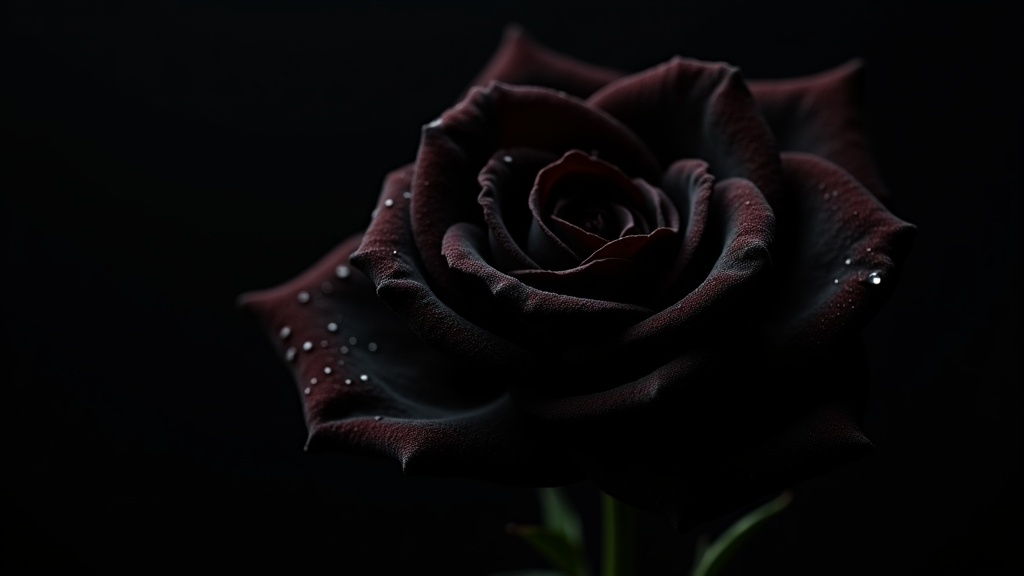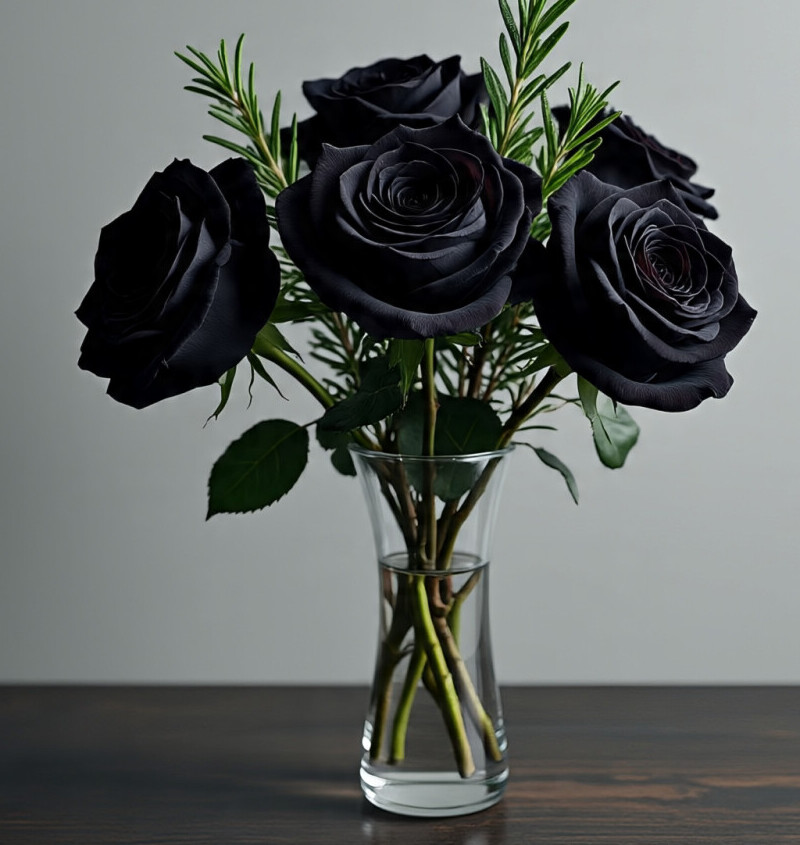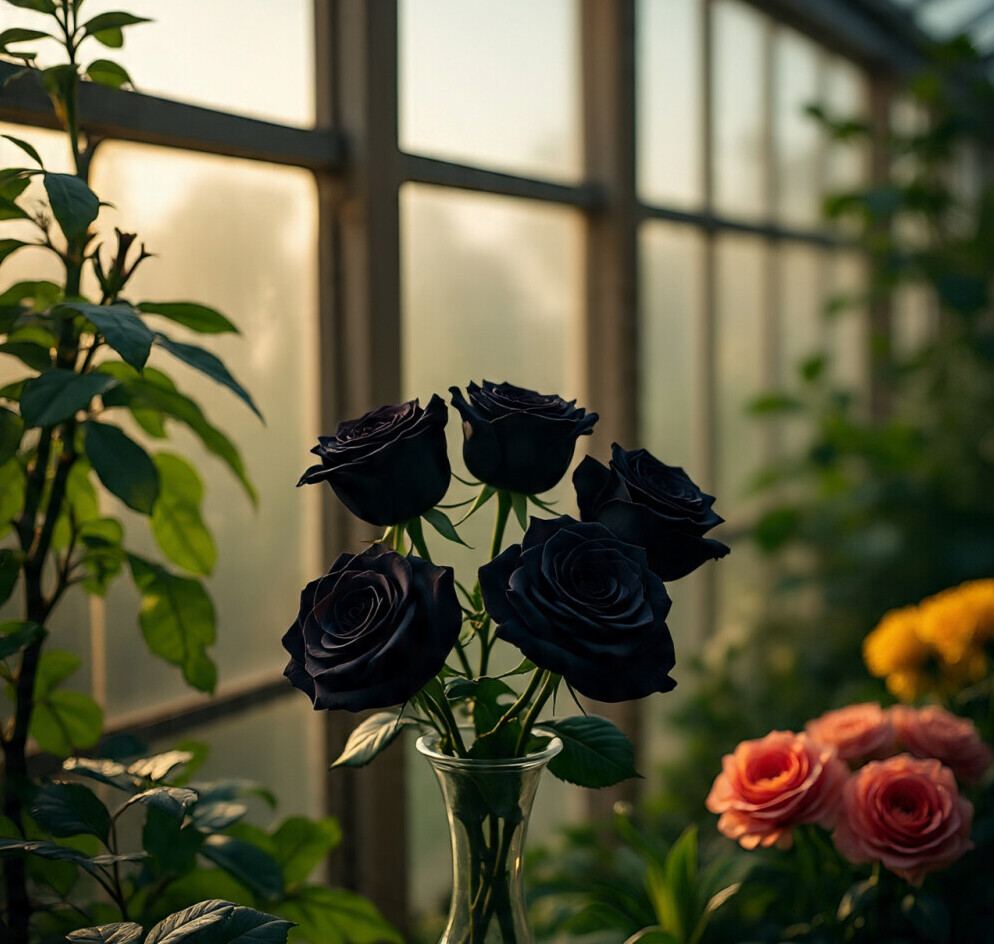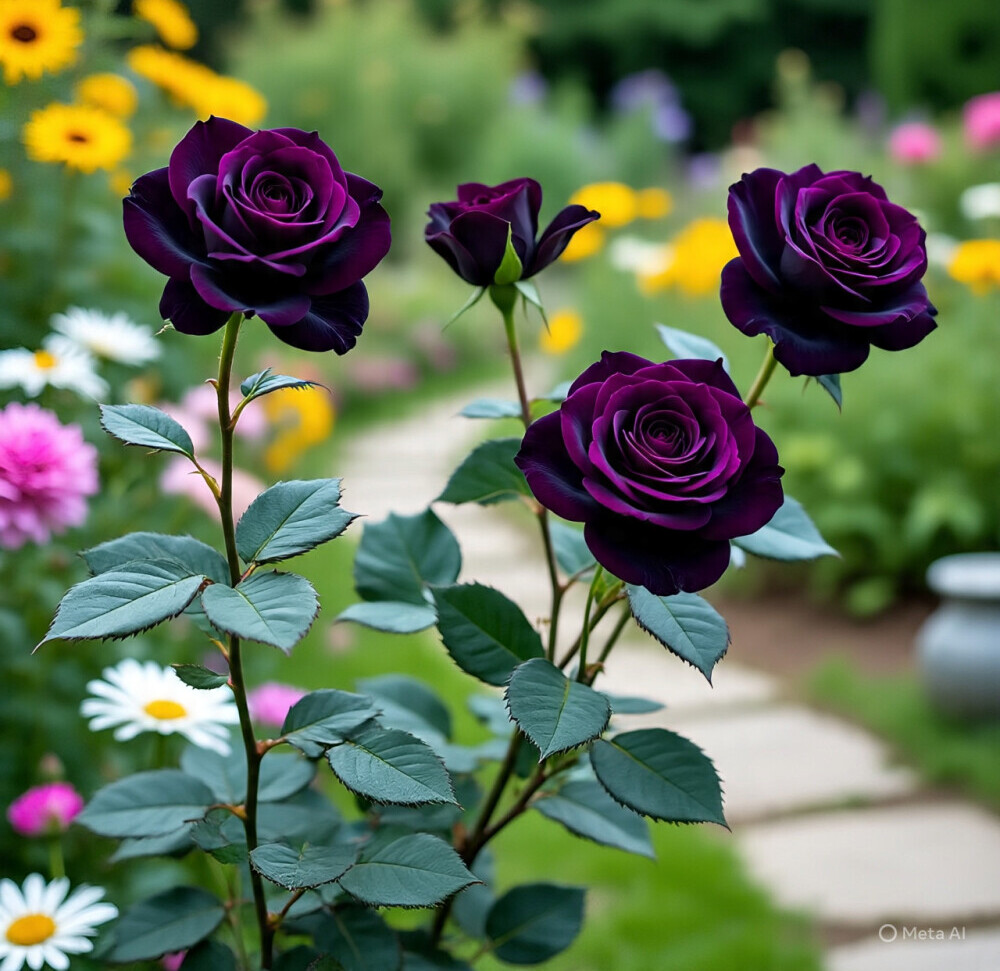Black roses have always captured my imagination.
With their deep, velvety petals and striking charm, they pop up everywhere from Gothic bouquets to dramatic garden borders.
The catch?
Truly black roses don’t naturally exist, but you’ll stumble upon plenty of dark red, plum, and purple roses that look about as close as you can get.
I’m going to break down the real story behind black roses, what they mean, which varieties are worth growing, and how to bring out those dark shades in your own backyard.
Along the way, we’ll take a closer look at their place in pop culture, gardening trends, and even some folklore you might not know.

The Symbolism of Black Roses
When most people think of black roses, they picture something mysterious or even otherworldly.
In history and legend, black roses often symbolized the unknown, farewells, or the closing of one chapter before the beginning of another.
They got picked to represent power, dignity, or even dangerous romance for centuries.
Different cultures see black roses in their own ways.
In Gothic traditions, they’re a popular centerpiece; think romantic poets, existential novels, and modern fashion trends.
You’ll spot them at alternative events, in tattoo art, and in symbolic storytelling, too. Black roses aren’t always about dark moods, though.
They’re showing up more and more in wedding bouquets and Valentine’s Day wraps for anyone tired of classic reds or pinks.
Their unique vibe brings drama and elegance to flower arrangements for birthdays, graduations, or even “just because” gifts.
The symbolism has grown to express rare beauty, transformation, and going against the grain. Gifting a single black rose or an entire bouquet says you’re not afraid to embrace the unconventional.
That makes black roses kind of perfect for people who like doing things differently. Some modern hacktivist groups and artists have even used black roses in protest imagery, flipping the meaning from sorrow or farewell to a more hopeful message of transformation and renewal.
In literature, you’ll pick up on references to black roses representing forbidden love, secret admirers, or even plots unfolding in grand gothic tales.
Over time, these flowers have moved from dark omens to badges of pride for anyone set on making a bold statement.
Are Black Roses Real?
This is a question I get a lot.
The short answer is no.
Roses with truly black pigmentation just don’t exist in nature. What breeders and gardeners call “black roses” are actually the darkest shades of red, purple, or crimson.
If you hold them up to the light, you’ll spot deep burgundy or purple undertones.
Over the years, rose breeders have been on the hunt for the darkest blooms possible. Through selective breeding, they’ve managed to create varieties that, in certain lighting, seem jet black.
Still, these are technically very dark reds, not a true black.
Florists take things a step further by dyeing fresh rose petals to create that more intense, midnight black color; these are the eye-catching “black roses” you’ll often see in dramatic bouquets or event displays.
Some home growers also experiment with creative techniques, like soaking white rose stems in black dye or food coloring.
While that creates a truly black flower for a short time, it’s not a result you’ll see growing naturally in the garden.
If a florist or online seller promises genetically true black rose seeds, that’s a red flag for a possible scam.
The natural pigment anthocyanin just can’t make petals truly black, though breeders continually push for deeper, richer shades by focusing on specific growing conditions and hybridization methods.
Historical accounts from the village of Halfeti in Turkey tell of nearly black roses growing in the region—though visitors find the blooms are more of a deep maroon in sunlight.
Popular Black Rose Varieties
If you’re looking to grow roses as close to black as possible, several cultivars really stand out for their color, petal structure, and hardiness. Here are a few of my personal favorites and the ones you’ll find most often on wishlists:
- Black Baccara Rose: This rose throws out large, velvety petals in a deep, dark red that often looks black in low light. It’s a favorite with florists for its moody elegance and long vase life.
- Black Jade Rose: A miniature rose variety, Black Jade has rich burgundy petals that are almost black at the edges. The compact size makes it great for smaller containers or detailed garden arrangements.
- Black Velvet Rose: Its name says it all. These roses pack some of the richest maroon petals, and the outer petals often darken to near black, especially in cooler temperatures.
- Midnight Blue Rose: While technically a deep purple, the dense, ruffled petals can appear virtually black when planted in shade. The spicy scent is a bonus if you like fragrant gardens.
- Other Noteworthy Varieties: Keep an eye out for Black Magic (another deep red black), Taboo (with strong dark red petals), and Halfeti Roses (named after a Turkish town known for its dark blooming roses). Breeders keep experimenting, so new varieties pop up pretty regularly. For those who enjoy exploring, checking for newly released cultivars each season remains one of the joys of rose gardening!
If you want to check photos or get these varieties, the online shops at Jackson & Perkins or David Austin Roses usually feature updated lists of what’s available. Expert gardeners sometimes post their own reviews and time-lapse bloom photos on forums—these real examples can help you spot subtle color differences between cultivars.
Cultivation Tips for Dark Colored Roses
Bringing out those dark, rich shades takes more than just seed choice. Dark roses benefit from a mix of climate, soil, and a bit of gardener’s patience. A few tips can give your plants a noticeable boost, so let’s jump in:
- Climate and Location: Cooler weather deepens petal color. If your region gets hot and sunny, plant in spots that offer afternoon shade; direct, scorching sunlight can lighten petals.
- Soil Choices: Well-draining soil with slightly acidic pH (6.0–6.5) helps. I always add compost and aged manure for strong growth and lush blooms.
- Greenhouse vs. Outdoor: Growing roses in a greenhouse or under shade cloth can prevent color from fading, but make sure humidity doesn’t get out of control. Too much moisture makes roses more susceptible to mildew. Periodic ventilation and spacing between plants helps keep mold and mildew in check.
- Fertilizer and pH Tweaks: Use balanced rose fertilizers or products high in phosphorus to help bloom color. Test your soil every season, and adjust with amendments if pH drifts too far off.
- Pruning and Care: Remove faded blooms to keep bushes tidy and encourage new flowers. Prune dead or weak stems early in the season. This keeps the plant focused on producing strong, dark blooms.
- Light Exposure: Filtered light or gentle morning sun keeps pigment vibrant. A little shade during the hottest part of the day goes a long way for that rich color you want.
- Mulch and Moisture: A layer of mulch regulates soil temperature, preserves moisture, and discourages weeds. Dark rose varieties especially appreciate consistent soil moisture for healthy blooms.
- Pest Management: Keep an eye out for aphids, black spot, and mildew. Organic neem oil or targeted rose sprays prevent problems before they start.
If you’re just starting out, I recommend asking your nursery which dark varieties do well in your local climate. Local clubs or Master Gardener groups are also super helpful for hands-on advice. Many gardeners share info on best practices for organic feeding and combating common rose diseases, so joining a local or online group offers ongoing support throughout the season.
Where to Find Black Roses
Finding authentic dark rose cultivars takes a bit of research. Not every nursery keeps them in stock, and lots of knockoffs are sold online as “rare black roses.” These are usually dyed or not as advertised.
- Local Nurseries: Some specialized or heritage nurseries offer Black Baccara, Black Velvet, and Midnight Blue as potted plants or bareroot options, usually in late winter or spring. Don’t hesitate to ask nursery staff about plant origins to avoid disappointment.
- Online Suppliers: Established sites like John Scheepers or Regan Nursery carry dark rose cultivars and ship nationwide. Always check reviews and quality guarantees before ordering. Real customer photos are your best tool for checking what the plants look like at maturity.
- Florists: For special events or gifts, local florists often offer “black” roses that are tinted or dyed rather than naturally grown. These are best for short term displays rather than planting, and you can ask about their dyeing process if you’re curious.
Avoid seed packets that guarantee jet black roses. They’re often just regular red or purple roses. Reading reviews and asking for real photos can save you from disappointment and wasted money.
Uses of Black Roses in Gardens & Floral Design
Planting black roses makes a garden pop. I like using them as statement pieces at the center of beds or along borders for bold contrast. They work especially well paired with white, blush, or pastel roses to really make their deep color stand out. Their dramatic color can instantly take your curb appeal or garden party decor up a notch.
If you’re into floral design, a bunch of black roses creates drama for Gothic, Halloween, or themed events.
They’re also picking up popularity for wedding bouquets, adding personality and edge to traditional arrangements.
Mixing black roses with pale peonies, eucalyptus, or silvertone foliage makes eye-catching centerpieces or displays for luxury occasions.
Even a single black rose in a smaller vase can add a modern twist to desk or table decor. For long-lasting dried arrangements, letting a dark rose air dry preserves the intense color and offers a lasting keepsake.
Recommended Products for Black Rose Lovers
- Black rose seeds / bareroot plants: Pick trusted sites like Jackson & Perkins for bareroot Black Baccara, Black Jade, and Midnight Blue. Many online retailers update their selections with new varieties annually.
- Specialized rose fertilizers: Espoma Rosetone or Rose and Bloom Food both keep blooms healthy and vibrant. Some gardeners also mix in bone meal for bigger, bolder flowers.
- Greenhouse kits / shade netting: Small poly greenhouses or black shade netting let you control sun exposure for maximum color depth. This is especially handy in hot climates or for those growing in containers.
- Floral dye kits: For DIYers, look for black floral sprays or dyes (try Design Master TintIT spray) to turn lighter roses jet black for arrangements.
- Organic mulch: Using bark chips or shredded leaves around your plants helps regulate moisture and temperature, which benefits dark colored roses in particular.
- Rose pruning shears: A pair of sharp, easy grip shears makes trimming and shaping easier, supporting more robust, colorful blooms.
Links and guides for these products are usually on gardener resource sites or big platforms like Amazon and Gardener’s Supply.
Many gardening blogs post comparison reviews if you want extra info before buying.
FAQs About Black Roses
Are black roses real or dyed?
Black roses sold at florists are usually dyed, but there are naturally grown varieties like Black Baccara and Midnight Blue that are so dark they look black in certain light.
Which rose is closest to a true black rose?
Black Baccara is one of the darkest roses you can grow. When the light is low, the petals look almost black. Midnight Blue and Black Velvet are two more to keep an eye on.
How do you grow roses that look black?
Start with a black rose variety and plant in a spot with partial shade during the hottest part of the day. Rich soil, balanced fertilizer, and regular deadheading help, too. Cooler climates or shaded gardens tend to keep colors darker. Mulch and consistent watering help develop deep coloring.
What does gifting a black rose mean?
Gifting black roses can mean mystery, a bold new beginning, farewell, or just admiration for rare beauty. It’s grown to stand for unconventional romance and “thinking outside the box” in the language of flowers.
Can I grow black roses in containers?
Absolutely! Compact varieties like Black Jade work well in pots. Make sure to use well draining, slightly acidic soil and provide good airflow to avoid mildew. Containers make it easy to move your roses around as the seasons change, optimizing sun exposure and protection as needed.
Is it possible to naturally breed a true black rose?
So far, even the most skillful breeders haven’t been able to create roses with pure black pigment. The science of rose genetics doesn’t allow for a truly black hue, though with advances in genetic engineering flowers may one day get even darker.
How long do dark colored roses last in a vase?
With proper care (fresh water changes, trimming stems, and removing spent petals), most dark rose varieties like Black Baccara can last up to 10 days. Keep them out of direct sun and drafts for best results.
Wrapping Up
Black roses bring an edge of mystery and rare beauty that’s tough to match with any other color.
While you won’t find a naturally pure black rose, the deep, dark varieties you can grow or buy are some of the most eye-catching flowers out there.
If you’re into dramatic gardens, unique gifts, or just want something a little different, black roses are absolutely worth your time.
Their rich symbolism, all the tricks and tweaks for deep color, and wide variety of uses in decor and design make them a true standout in the gardening world.
Curious about other non traditional roses?
Keep following the Unusual Rose Colors Series with my breakdown on Green Roses: The Hidden Gem of Rose Gardens.
Feel free to ask questions in the comments or share your own experiences with dark colored roses!
Happy gardening and stay tuned!!!!!!!!!
Here’s a little transparency: Our website contains Amazon affiliate links. This means if you click and make a purchase, we may receive a small commission. Don’t worry, there’s no extra cost to you. It’s a simple way you can support our mission to bring you quality content.”




I’ve always been fascinated by black roses, and this article cleared up some of the myths I’ve heard about them. I had no idea that truly black roses don’t exist and that it’s actually the deep reds and purples like Black Baccara and Midnight Blue that give off that moody vibe—makes me want to plant a few just for the drama. Your tip about partial shade and cooler temps deepening the color was super helpful; our summers get pretty intense, so maybe a little afternoon shade is the way to go. I also liked the suggestion of pairing them with lighter roses for contrast—white and black together would look stunning. Do you have a favourite among these varieties, or one that’s easiest for beginners? Thanks for all the practical cultivation tips; you’ve definitely inspired me to experiment with some dark roses in my garden.
Thanks so much, A Jaynes! I am so happy you found the article helpful in debunking some myths about black roses.
I’m glad you liked the tips on cultivation and pairing with lighter roses – the contrast really makes them pop! As for favorites, I think ‘Black Baccara’ is a popular choice for its dramatic color, but ‘Midnight Blue’ is also a stunning option.
For beginners, I’d recommend starting with ‘Black Magic’ – it’s relatively easy to care for and produces beautiful, dark blooms.
If you have any more questions or need further advice, feel free to ask.
Wish you the best with your black rose garden, and I’d love to see how they turn out.